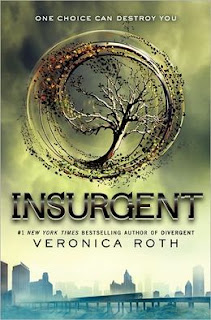 Fury of the Phoenix by Cindy Pon
Fury of the Phoenix by Cindy PonSo, pardon me, but this is completely a reader error on my end. I didn't realize that Fury of the Phoenix is apparently a sequel to Silver Phoenix. Again, my bad. So if you don't mind, I'm going to stumble through this a lot.
I had an inkling of a suspicion that this was a sequel through the first few chapters as it kept referencing past events as if I should know them very well. Obviously, I don't. Anyways. Inevitably, this will probably contain spoilers to Silver Phoenix and I have no idea what's a spoiler and what's common knowledge, so read at your own risk.
So we have three main characters: Ai Ling, Chen Yong, and Zhong Ye. Ai Ling is a young girl who seems to have a supernatural ability described as a spirit that originates in her navel (it reminded me of The Girl of Fire and Thorns, which makes me wonder if navel abilities are becoming a trend). From what I can tell, she can sense other people's emotions, and even control them. She also seems to be able to use it to overhear conversations as well. Anyways, so from what I gathered, at one point Ai Ling was married to Zhong Ye who is an incredibly bad guy and killed him on their wedding night. Also, Ai Ling seems to have tried to resurrect Chen Yong's brother which is a bad thing since it's a dark art and hasn't told Chen Yong about it. From what I've gathered, Ai Ling used to be chosen by an immortal, but lost favor after she tried to resurrect Chen Yong's brother. She apparently cut out his heart, tried to call him back from the Underworld, but either failed or lost her will to do it and burned his entire body. They also have a big belief or accepted fact of the reincarnation cycle. So when Ai Ling did this to Chen Yong's brother, she might have screwed up his chances to be reincarnated. Maybe. I'm not certain.
Chen Yong is a young man who is leaving the country of Xia in search of his father in Jong (I might have spelled that wrong). He's very good at languages, writing, some form of martial arts where there's a bunch of different stances, and seems to dabble in art. He is either Ai Ling's childhood friend, or something because the two of them are very close. Since we have the narration from Ai Ling's point of view, we know that she's desperately in love with him, but is unsure of his feelings since at the beginning of the book we find out that his mother has betrothed him to some other lady. So that's interesting.
Zhong Ye is our other narrator (AND THIS WAS EXTREMELY CONFUSING UNTIL ABOUT 3/4 OF THE WAY THROUGH THE BOOK) who narrates when is nineteen years old and explains his life in the palace, how he met an alchemist from a different country that sought a spell for immortality. Now Zhong Ye appears to be a very scheming man as he sets himself up to be in better standing with the emporer, and gains the confidence of the foreign alchemist. He doesn't seem like a bad man, just ambitious. He lives in the grounds where the concubines are kept since he's a eunich and one night the emporer requests a new girl for his bed and Zhong Ye scrambles around and finds Mei Gui who is attended by Silver Phoenix. Gradually, Zhong Ye falls in love with Silver Phoenix. It's quite cute.
So the confusing part is, is that Ai Ling married Zhong Ye when he was older, and this probably took place maybe less than a year after she kills him. But, the other narration is from Zhong Ye when he's nineteen and just beginning to become tangled in the immortality spell with the alchemist Yokan.
So, in Ai Ling's narration we see Chen Yong and her travel together on a boat from Xia to Jong (again, pardon me if I spelled that wrong, names of places has never been my forte), and when they arrive in Jong and what happens from there.
In Zhong Ye's narration, we see what led him to the path of evil so to speak and what turned him into a man that Ai Ling would need to kill.
It's really interesting and it makes me tremendously wish I had read the first book initially. At this point, it seems that I've pieced together most of the first book based on what I read in the second book so I am reluctant to go back and read it. It did take me a bit longer to get through the book than normal as I kept having to stop and puzzle and try to piece together the first book. It made the read challenging, but the writing was so crisp and enriched that I couldn't very well put the book down either.
So all in all, Fury of the Phoenix was good. I don't know if it was a good follow up sequel to Silver Phoenix since I didn't read the first book, but Fury of the Phoenix was a good book.















